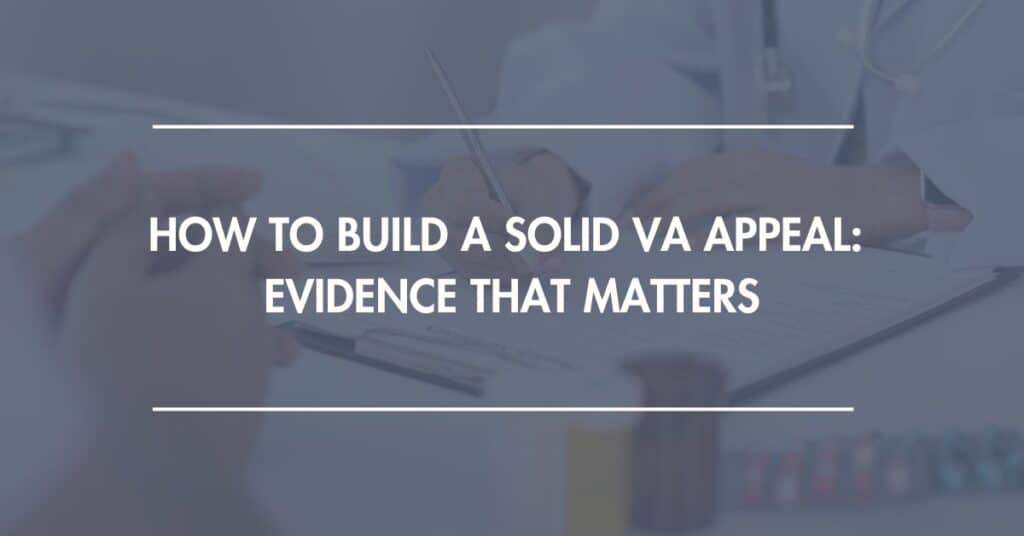
Receiving a denial or unfavorable decision on your VA benefits claim can be discouraging, but it’s important to remember that the VA appeal process exists precisely to address these situations. Many veterans successfully overturn initial decisions by submitting well-constructed appeals with compelling evidence. Understanding how to build a strong VA appeal and what types of evidence carry weight with decision-makers can significantly improve your chances of obtaining the benefits you deserve.
Understanding the VA Appeal Process
Before diving into the mechanics of building your VA appeal, it’s crucial to understand the framework within which you’ll be working. The VA modernized its appeals system in 2019, creating three distinct review lanes that veterans can choose from after receiving an unfavorable decision. Each lane offers different advantages depending on your specific situation.
The Supplemental Claim lane allows you to submit new and relevant evidence that wasn’t part of your original claim. This option is often ideal when you have additional medical records, buddy statements, or other documentation that strengthens your case.
The Higher-Level Review lane involves having a senior reviewer examine your case without accepting new evidence, focusing instead on whether the original decision-maker made an error based on the existing record.
Finally, the Board Appeal lane takes your case to the Board of Veterans’ Appeals, where you can choose to submit new evidence, request a hearing, or have the Board review your existing record.
Selecting the right lane depends on your circumstances. If you have compelling new evidence, a Supplemental Claim often provides the fastest path to success. If you believe the decision-maker misinterpreted existing evidence or failed to apply the law correctly, a Higher-Level Review might be more appropriate.
The Foundation of a Strong VA Appeal
Every successful VA appeal begins with a thorough understanding of why your claim was denied. The VA’s decision letter will outline the reasons for denial, and this document serves as your roadmap for building your VA appeal. Common reasons for denial include insufficient evidence linking your condition to military service, lack of a current diagnosis, or failure to demonstrate that your condition meets the criteria for a particular disability rating.
Once you understand the specific deficiencies in your original claim, you can strategically address each one. This targeted approach is far more effective than simply resubmitting the same information or adding random documentation without a clear purpose.
Timing also matters significantly. You have one year from the date of your decision letter to file a Supplemental Claim or request a Higher-Level Review while preserving your effective date, which determines when your benefits would begin if your VA appeal succeeds. Missing this deadline doesn’t prevent you from appealing, but it may result in a later effective date and potentially thousands of dollars in lost back pay.
Evidence That Matters: Medical Documentation
Medical evidence forms the cornerstone of virtually every VA benefits appeal. The VA operates under a well-established framework that requires three elements for service connection: a current diagnosis, evidence of an in-service event or injury, and a medical nexus linking the two. Strong medical evidence can address all three elements comprehensively.
Current medical records from treating physicians carry substantial weight, particularly when they include detailed clinical findings, test results, and functional assessments. A brief note stating “patient has back pain” holds far less value than a comprehensive examination documenting range of motion limitations, pain levels, frequency of flare-ups, and impact on daily activities. When seeking medical evidence for your appeal, request thorough examinations that document the full extent and impact of your condition.
Independent Medical Opinions (IMOs) or nexus letters from qualified medical professionals can be particularly powerful in appeals. These documents provide expert medical opinions on whether your current condition is “at least as likely as not” related to your military service. The phrase “at least as likely as not” represents the standard of proof in VA claims, which basically means a 50 percent or greater probability, which is consistent with the VA’s own regulations and the “benefit of the doubt” rule, which is a tiebreaker for disability claims. A well-crafted nexus letter reviews your service records, current medical evidence, and relevant medical literature before rendering an opinion on service connection.
However, not all medical opinions carry equal weight. The VA gives more credence to opinions that provide detailed rationale, cite specific evidence from your records, and come from providers with relevant expertise. A one-paragraph letter stating “this condition is service-connected” without supporting analysis will likely be dismissed as insufficient.
Lay Evidence: The Veteran’s Perspective
While medical evidence establishes the clinical aspects of your condition, lay evidence, which may include statements from you, family members, friends, or fellow service members, can provide crucial context about how your condition affects your daily life and when symptoms first appeared. The VA is required to consider competent lay evidence, and it can be decisive in close cases.
Your personal statement should be detailed and specific. Rather than saying “my knee hurts,” describe what you cannot do because of your knee: “I can no longer stand for more than 15 minutes without severe pain, which forces me to sit down frequently at work. I’ve had to stop coaching my daughter’s soccer team because I cannot demonstrate drills or keep up with the players.”
Buddy statements from individuals who served with you can corroborate in-service events or injuries, particularly when service medical records are incomplete or missing. These statements are most effective when they provide specific details: dates, locations, circumstances, and what the witness personally observed. A statement saying “I served with John and he injured his back” is far less compelling than “On March 15, 2005, at Camp Lejeune, I witnessed John fall approximately 8 feet from a vehicle during training exercises. He complained of severe back pain afterward and I saw him limping for several weeks.”
Family member statements can document changes in your condition over time and describe symptoms that may not be fully captured in clinical settings, such as sleep disturbances, personality changes, or limitations in household activities.
Service Records and Historical Evidence
Your military service records can provide crucial evidence establishing in-service events, injuries, or stressors. Service treatment records documenting injuries or complaints during active duty directly support your claim. Even if you weren’t formally diagnosed during service, contemporaneous medical records showing that you sought treatment for symptoms related to your current condition can establish an important link.
Personnel records, including performance evaluations, unit rosters, and deployment records, can corroborate exposure to hazards or establish the timeframe and location of your service.
For conditions presumed to be service-connected based on specific exposures, such as Agent Orange exposure in Vietnam or burn pit exposure in Iraq and Afghanistan, documentation of your presence in these locations may be sufficient to trigger presumptive service connection.
When service records are incomplete or unavailable, alternative evidence becomes critical. Morning reports, unofficial records, personal journals, photographs, and statements from fellow service members can help fill gaps in the official record.
Strategic Considerations in Presenting Evidence
Submitting evidence is only half the battle; presenting it effectively is equally important. Organize your evidence logically, with a clear cover letter or brief that explains what you’re submitting and why it matters. Connect the dots for the decision-maker rather than simply providing a stack of documents and hoping they’ll piece together the puzzle.
Address weaknesses in your case directly rather than ignoring them. If the original decision cited specific deficiencies, explain explicitly how your new evidence overcomes each one. This demonstrates that you understand the VA’s concerns and have taken steps to address them systematically.
Finally, consider seeking assistance from a Veterans Service Organization representative or an accredited attorney who specializes in VA benefits. These professionals understand what evidence carries weight and can help you develop a comprehensive strategy for your VA appeal.
Persistence Matters in the VA Appeal Process
Building a strong VA appeal requires understanding the appeals process, gathering compelling evidence, presenting your case strategically, and being persistent. Medical documentation establishes the clinical foundation of your claim, while lay evidence provides essential context about your symptoms and their impact. Service records tie your current condition to your military experience. By addressing the specific reasons for your initial denial with targeted, high-quality evidence, you can significantly improve your chances of success.
If your VA benefits claim was denied, you should also consider contacting an experienced Veterans Disability Benefits Attorney in New Jersey to discuss your legal options. The veterans’ benefits attorneys at Bross Frankel PA have the experience to help you craft a VA appeal with the best chance of getting the compensation you’ve earned through your military experience. A knowledgeable VA disability benefits attorney will work with you to help you determine the best method of VA appeal, then file the appropriate paperwork to fight for your right to compensation. We will also assist you in compiling your medical records for your benefits claim.
Call us at (856) 795-8880 or contact us online to schedule a no-obligation VA claim review.

Jennifer Stonage is a Senior Associate Attorney at Bross & Frankel, P.A. and primarily assists with the firm’s Veteran’s Benefits matters. She believes that the veterans who served our country are entitled to the help and compensation they are entitled to, and will put her knowledge to work to secure the highest possible compensation ratings. The VA process can be incredibly tricky to navigate. Let somebody who knows the system work to help you.